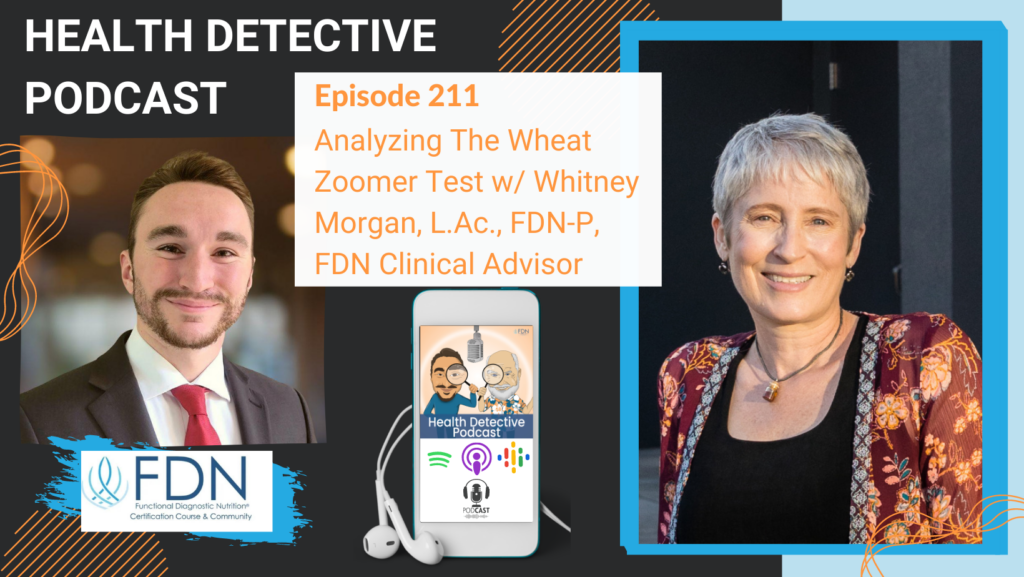Introduction
[00:00:00] Detective Ev: Hello and welcome to the Health Protective Podcast by Functional Diagnostic Nutrition. Today’s interview is all about analyzing the Wheat Zoomer test with one of our clinical advisors here at FDN, Whitney Morgan.
Hello there Whitney. Welcome back to the Health Detective Podcast. How are you?
[00:00:38] Whitney Morgan: I’m great, Evan, thanks. Glad to be here. Thanks for having me.
[00:00:41] Detective Ev: Yeah. So, if you guys are signed up for our FDN Insider training that’s fdntraining.com/insider, you would’ve heard Whitney recently. We did a bunch of cool 20-minute interviews around Christmas time. You could still go listen to those now if you’re listening to this at any point in your year.

It’s just really intensives on very specific topics. One of the things that we teased at that time was the idea of Whitney coming back on this podcast to share her expertise with a lot of the stuff that she knows not only about gluten, we kind of covered that before. Specifically, we’re going to be covering some differences between food sensitivity tests today and then the Zoomers.
The Wheat Zoomer: Don’t Sacrifice Your Health
I’m always very transparent with the audience where I’m at knowledge-wise, cause I do a lot of other things outside of FDN. Zoomers are pretty new to me. I’m excited about learning it. I like to come in with that healthy level of just ignorant enough that it’s actually new information to me, but also not so ignorant that I can’t ask intelligent questions to you today.
With that said, if you guys want to hear Whitney’s original story, she was literally the second person ever on this podcast out of like 200 something episodes now. Go way back, you’ll hear my crappy microphone at the time. There’s no video. It’s a different setup, but it’s still cool. She has a powerful story.
What you actually really embody quite well, Whitney, a few things, but one of those that I liked is your part of your story. I remember this from all the way back then where you kind of had this conversation with your family about like, it’s almost me or the gluten, right?
It’s not that people don’t love us, but sometimes they don’t get how serious this is for us as the people actually suffering with these conditions. So, if we can show them evidence and at a certain point we’re not changing, it’s like we need to decide what we like more, gluten or our own family members. When it’s put that way that’s powerful.
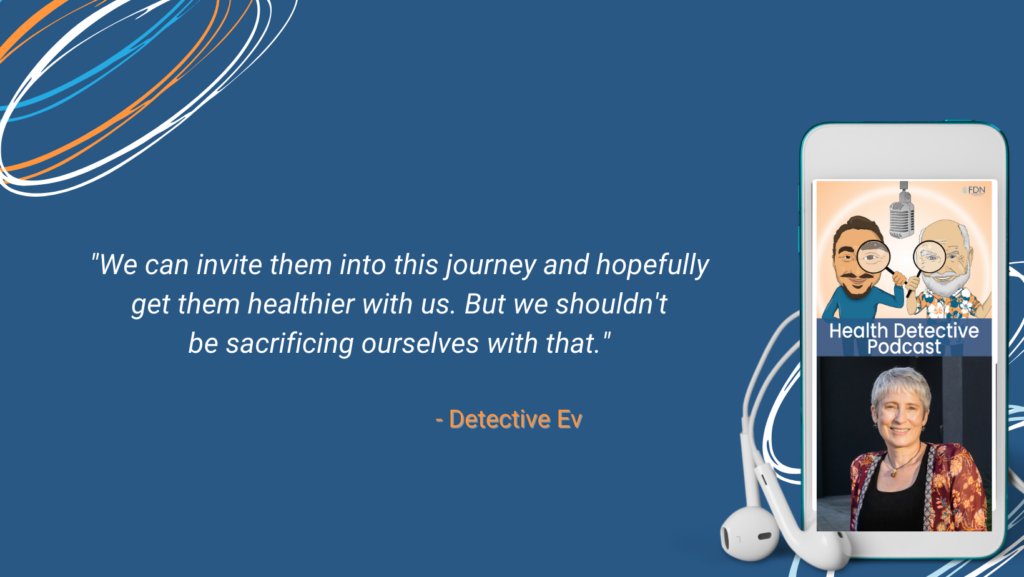
Every now and then you might lose a friendship or two that way, but we can’t sacrifice our own health for the people around us always. We can invite them into this journey and hopefully get them healthier with us. But we shouldn’t be sacrificing ourselves with that.
Allergy Testing vs. Sensitivity Testing
It’s not fun if you’ve had these diseases and Whitney’s been through a lot, so go check that out. But today she’s on the other side doing well. We’re here to talk about the expertise. Before we share the lab results, if you are listening, we’ll have this on YouTube as always. When we do a lab test, we always screen share it. But we will try to do our best today to make it something that you could enjoy on audio as well.
Whitney let’s start with the differences between all these food sensitivity tests out there. It can be overwhelming. There’s people that go to the allergist, then there’s the sensitivity tests. I see them at CVS and Rite Aid now. You can buy them off the shelf. We use the MRT a lot in the course. I don’t even know where to start with this. I’ll kind of throw that at you because it’s a really complicated question.
[00:02:57] Whitney Morgan: It is, it’s complicated and unfortunately, it’s one of the tests out there, you and I were just talking about this, where the general public feels like, oh, this is simple. It’s just like, am I sensitive or not? Right?

So first off, allergy testing and sensitivity testing are totally different. You and I don’t do allergy testing as a rule. Usually if you have a legit allergy, you know it. It’s an anaphylactic sort of thing, you know, massive five alarm fire. That’s more the scope of your conventional medicine, your allergist, your immunologist, that kind of stuff.
Whole Food Antigens vs. Peptide Antigens
Food sensitivity is different in that symptoms can show up one day later, three days later, four days later. Symptoms may not show up at all. In fact, the only symptom you might have from a food sensitivity is your immune system reacting and potentially you being in those preliminary stages of developing an autoimmune disease.
So, a lot of people, particularly with gluten sensitivity and some other, like dairy, don’t even know they’re sensitive until they get a diagnosis. Then they come see someone like you and me and go, how did this happen? We start doing the testing. It’s like, oh, well you have gluten sensitivity, corn, dairy. And they’re like, well, I feel fine when I eat those things. How many times have you heard that? Right? I don’t have symptoms. So that’s one thing.
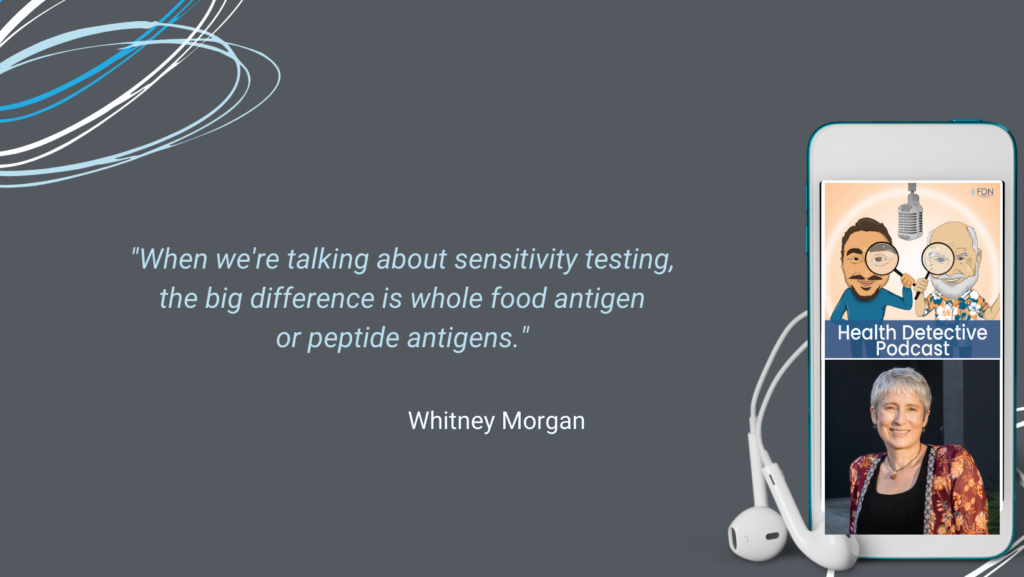
Testing is critical, to correlate food sensitivity testing along with symptomology is critical, right? You need both sides of the picture. But then when we’re talking about sensitivity testing, the big difference is whole food antigen or peptide antigens, okay?
The way I explain it to my clients is most testing out there, they’re using whole foods. Think of it like you have a puzzle and it’s all put together. You can see the picture. Let’s say you put a puzzle together, it’s just a big old picture of a kernel of corn. That’s the whole food antigen, but it’s made up of lots of little pieces that fit together to make that whole food.
So, the test is using the whole food antigen. That antigen takes a very specific antibody response, and they hook together. That’s the antibody, it’s the way your immune system attacks that antigen. Right? They hook together in a lock and key formation.
Sensitivity to the Puzzle Pieces is Sensitivity to the Whole Food
Well, if you take that whole food and you break it apart, now you just have a box full of puzzle pieces. Each individual piece is a peptide. It’s a peptide of that whole food. Each peptide takes a unique antibody in a lock and key situation totally different than the whole food.
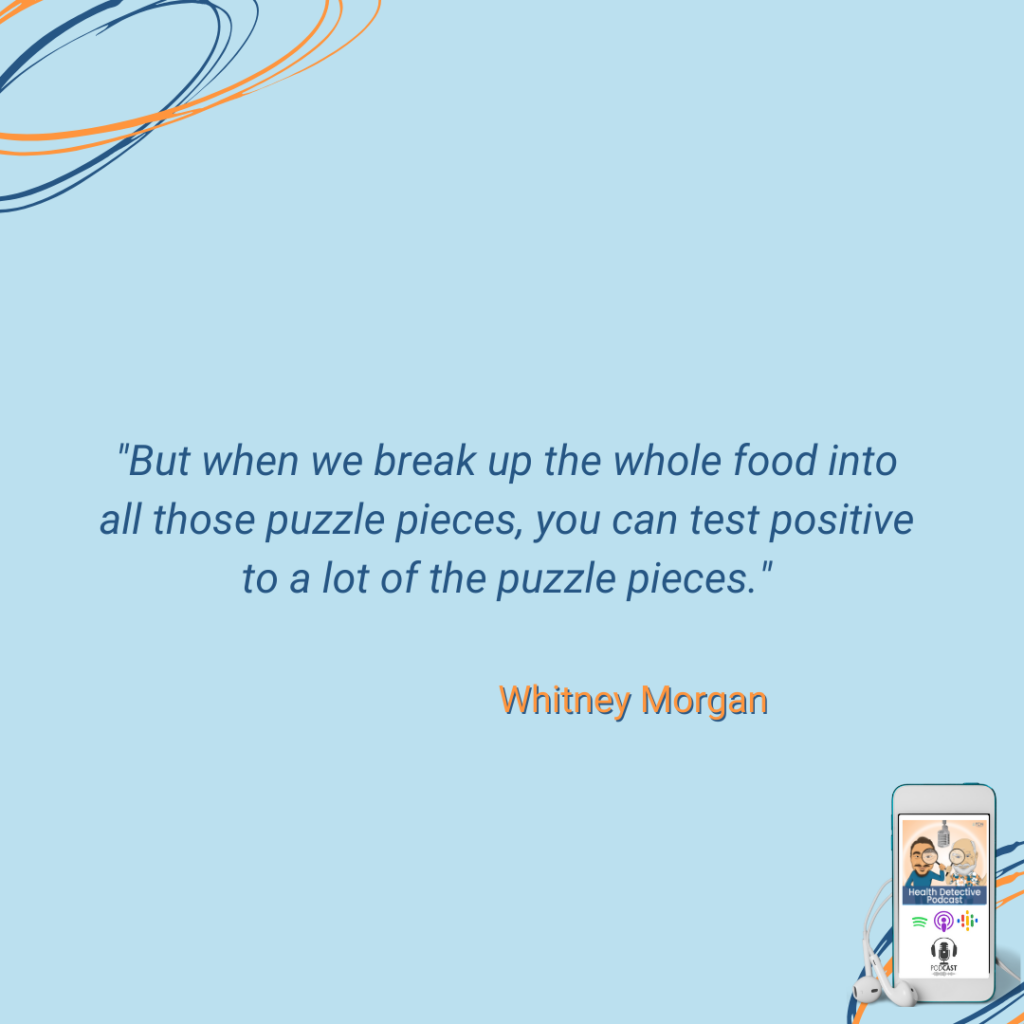
So, the big takeaway from that is that you can test negative to a whole food, meaning it’s safe for you to eat. But when we break up the whole food into all those puzzle pieces, you can test positive to a lot of the puzzle pieces. When you’re sensitive to any of those puzzle pieces, you are sensitive to that food.
So, my problem with more of the traditional testing being like the only thing that some practitioners are using is that there’s such a vulnerability at a false negative. I see this all the time with wheat and corn and dairy and other grains and legumes and nuts that people are testing negative to these things on a whole food test, but they’re actually very sensitive when we do the peptide-based testing.
[00:06:38] Detective Ev: Wow. So first of all, I’m excited because when I went through the course like six years ago, Whitney, she was already part of FDN. Were the Zoomers around six years ago, first of all?
[00:06:46] Whitney Morgan: It’s a good question. Maybe just coming on the scene, actually.
[00:06:51] Detective Ev: Certainly, they weren’t being used in this way where it’s like now we’re having conversations about this regularly.
Negative to a Whole Food but Positive to Its Peptide
One of the things is now in the course, I actually just found this out because of the people in my life that are going through FDN. You guys can actually hear from Whitney directly in the FDN course really breaking this stuff down in depth. But my point is, again, I admit, I’m still learning plenty of this.
I love how our clinical advisors, first of all, have the best analogies. I love all of them, but you and Ryan in particular. I gotta say, you guys make these really cool pictures in people’s heads. I’m thinking about this puzzle now. Just to be clear and forgive me if I miss something. You are suggesting that I have this entire puzzle made up of these peptide pieces, more or less, and I could not react to the whole puzzle, but in theory, I can react to a puzzle piece.
Whitney Morgan: Yes.
Detective Ev: That food test that was looking at the whole puzzle would not catch that.
[00:07:34] Whitney Morgan: Yes. A lot of people go, how is that possible?
Well, because if you think about it, your digestion breaks down your food, right? Unless that food is broken down really well, it’s not assimilated, the nutrients don’t get assimilated and the proteins into the bloodstream because they’re too big.
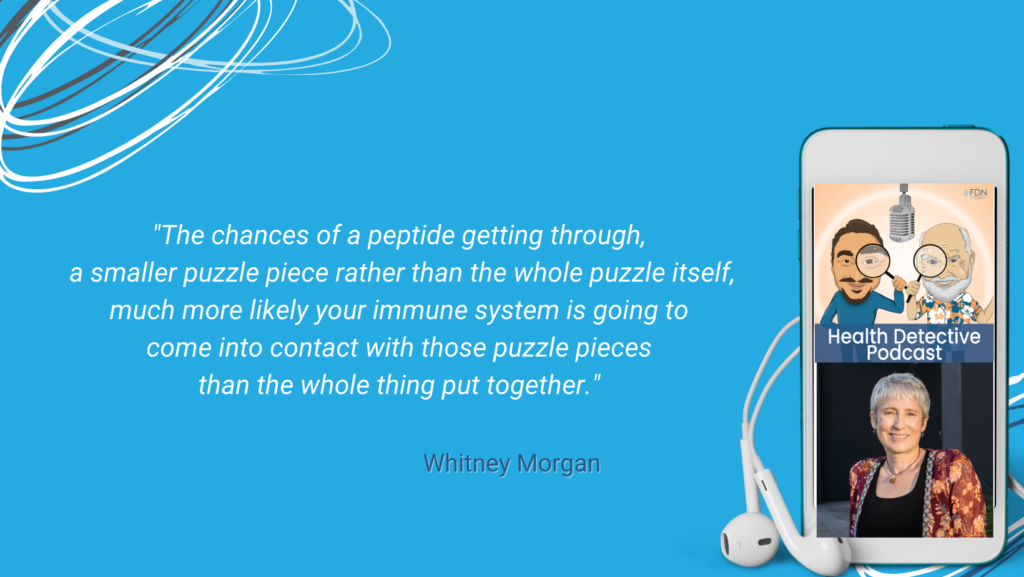
But if your gut is leaky, then larger proteins that are partially digested get through and they don’t belong there. Then your immune system sees them and goes, whoa, wait a minute. The chances of a peptide getting through, a smaller puzzle piece rather than the whole puzzle itself, much more likely your immune system is going to come into contact with those puzzle pieces than the whole thing put together.
Focus on Cleaning It Up
So, when I see a traditional test, usually this is my clinical advising stuff and I’m looking at other people’s clients, I see a whole food, antigen-based test and the client is super reactive. Well, I know right out of the gate their digestion probably sucks, and they’ve got a leaky gut. That’s primarily what that means.

It doesn’t mean that all the foods they’re reacting to are bad for them. In fact, most of them, they will be able to reintroduce and safely eat again. What it means is that their gut is leaky, and their digestion is poor. So, we really need to focus on that and clean it up so these foods can be safe again.
[00:09:01] Detective Ev: This is very interesting. I think this connects a huge disconnect that I hear a lot of the time in this functional community. We have some people completely dismissing the food sensitivity testing. It doesn’t matter at all. It’s because technically, you know, you can heal a lot of these things.
Now at the same time we’ll get people like Reed, founder of FDN, adamant about this. I think this is the connection. It really comes down to this. Does it mean that these food sensitivity tests are not useful? No, it doesn’t. But he would never advocate for running it by itself. He does not say that. He says he wants you to do it with all these other tests. I think that’s where people miss it.
It’s Insight into Where the Person’s At
Yes, you actually might be correct that running this as a standalone sometimes might not be the best option. I was telling Whitney; this is something I use as a standalone with transparency to the client that the only reason I’m doing this is because, one, you’re telling me you truly cannot afford other labs right now. And two, you kind of needed a little extra belief. So, if you know that there’s going to be more work and this is going to help you tip to the other side, I’m all for that.
Here’s the thing, it’s like a one-off consult for me. I’m not getting rich off doing this. I don’t even want to do this. I want to do the bigger stuff with them. We just have to be clear on that. Then realize in the FDN system, this was always intended, like the MRT thing that we teach, to be used in conjunction with all these other labs so that you don’t have to be sensitive or reactive to these things forever.
There’s some disclaimers on it depending on how you’re reacting to things like gluten, of course. That might be the one where this is an issue forever.
Let’s take, something random like chicken for some people. We teach in the course, if it’s yellow on the MRT, maybe after 60 days we can reintroduce it. If it’s red, you’re going to want to look at 90 plus.
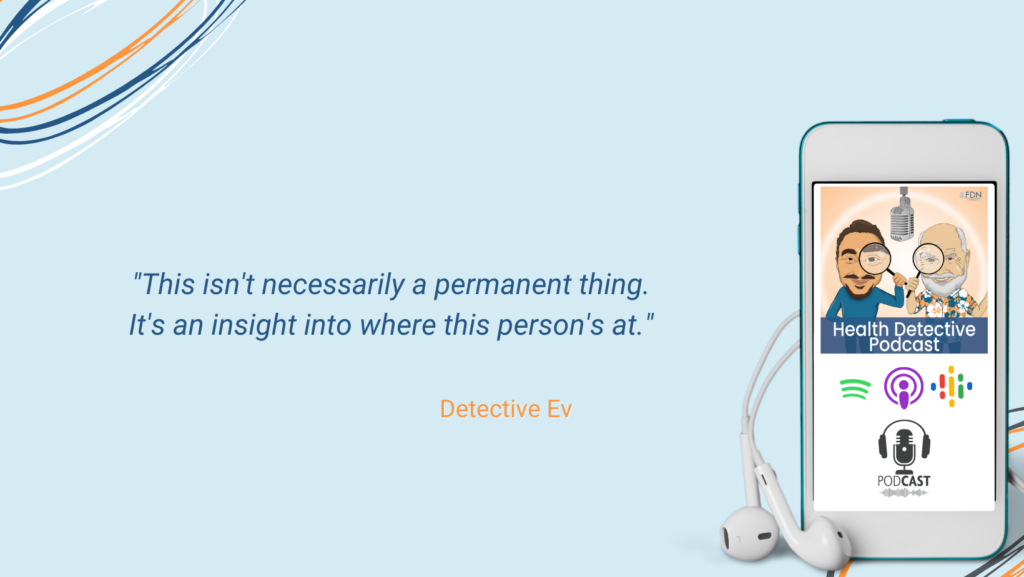
But the obvious question then, to someone who hasn’t even been involved in this space, hasn’t done the course, is well, why would you be able to reintroduce something that you’re sensitive to? And it’s because of what you just talked about. This isn’t necessarily a permanent thing. It’s an insight into where this person’s at.
The Wheat Zoomer: A Sunburn on the Inside
Yes, you can make them feel a lot better pretty quickly by removing those foods. But let’s say you’re sensitive to chicken, you got a red. You remove it for 90 days and then, put it in. Very likely because of the leaky gut and all these other problems that you have, aren’t you just going to develop sensitivities most likely to other foods that you didn’t really have an issue with before? Cause now you’re prioritizing them in the diet so you kind of lead to the same issue.
[00:11:04] Whitney Morgan: Well, yeah. Particularly if you’re consuming foods and you’re participating in certain lifestyle habits that make your gut leaky again.
[00:11:13] Detective Ev: You’re doing nothing else except the sensitivity stuff.
[00:11:15] Whitney Morgan: Right.
So, people say, okay, well I’m going to heal and seal my gut and then everything’s going to be okay. Well, not really. You have to maintain a healthy gut. Because our modern world just causes leaky gut. I mean, across the board, it does.
Here’s another analogy for you. Let’s say you’ve got a really bad sunburn. Okay? Well, when you have a bad sunburn, anything that touches your skin it’s like on fire, right? You’re super, super hypersensitive. Nothing can touch you. Once that sunburn heals, you’re fine.

Well, having a leaky gut and gut inflammation and all of the disruption in the gut that creates this hostile environment that we really can’t feel, it’s like having a sunburn on the inside.
The Wheat Zoomer: Intolerance vs. Sensitivity
Now you have all these things that are coming through the gut that if you weren’t sunburned on the inside, they wouldn’t bother your immune system. They wouldn’t bother your gut. Everything would be okay. So, intolerance or sensitivity is often a reflection of the level of damage that’s there. If we tone down that damage and we heal it, then the immune system goes back to having that greater tolerance and it can accept more things. So, it’s always a moving target.
[00:12:33] Detective Ev: Got it. You brought up intolerance, so I want to bring this up before we get to this actual lab result.
It is worth mentioning, especially if someone clicks on us for the first time. Maybe like this title because they saw something about gluten. So, they’re like, all right, I don’t even know these guys, but I’m clicking on this. This is one thing that I find all the time when I’m talking to people that they get confused about. You brought up this idea that people consume a food, they don’t feel a symptom from it, and so they think they’re not sensitive. Because if you had a headache, they might be able to make that connection.
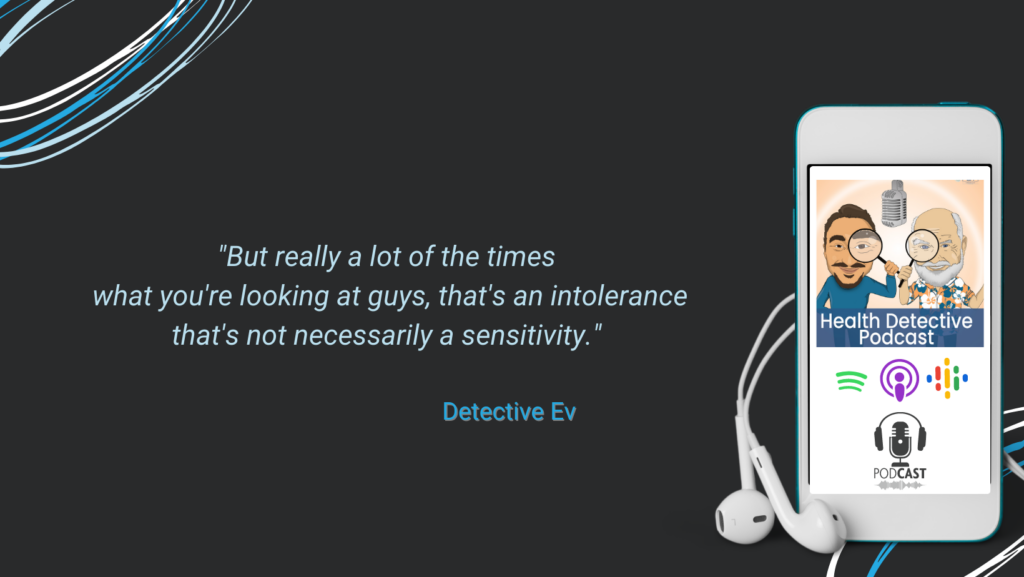
I find that some people find digestive distress to be a hundred percent equatable with the word sensitivity. To the lay person that’s not trained in this, I mean, fair enough. I totally understand that logic. But really a lot of the times what you’re looking at guys, that’s an intolerance that’s not necessarily a sensitivity.
The Wheat Zoomer: Different Types of Immune Response
The easy example that I try to use now, I didn’t think of it originally, but I’m like, well, a lactose intolerance. Just because you have a lactose intolerance, you know, a lot of those people take the lactase enzyme. Now their stomach troubles go away. Well, just because you had the gassiness or you had to go to the bathroom right afterwards, that does not necessarily imply that you had some type of immune response. You could have a sensitivity as well, but it does not mean an immune response.
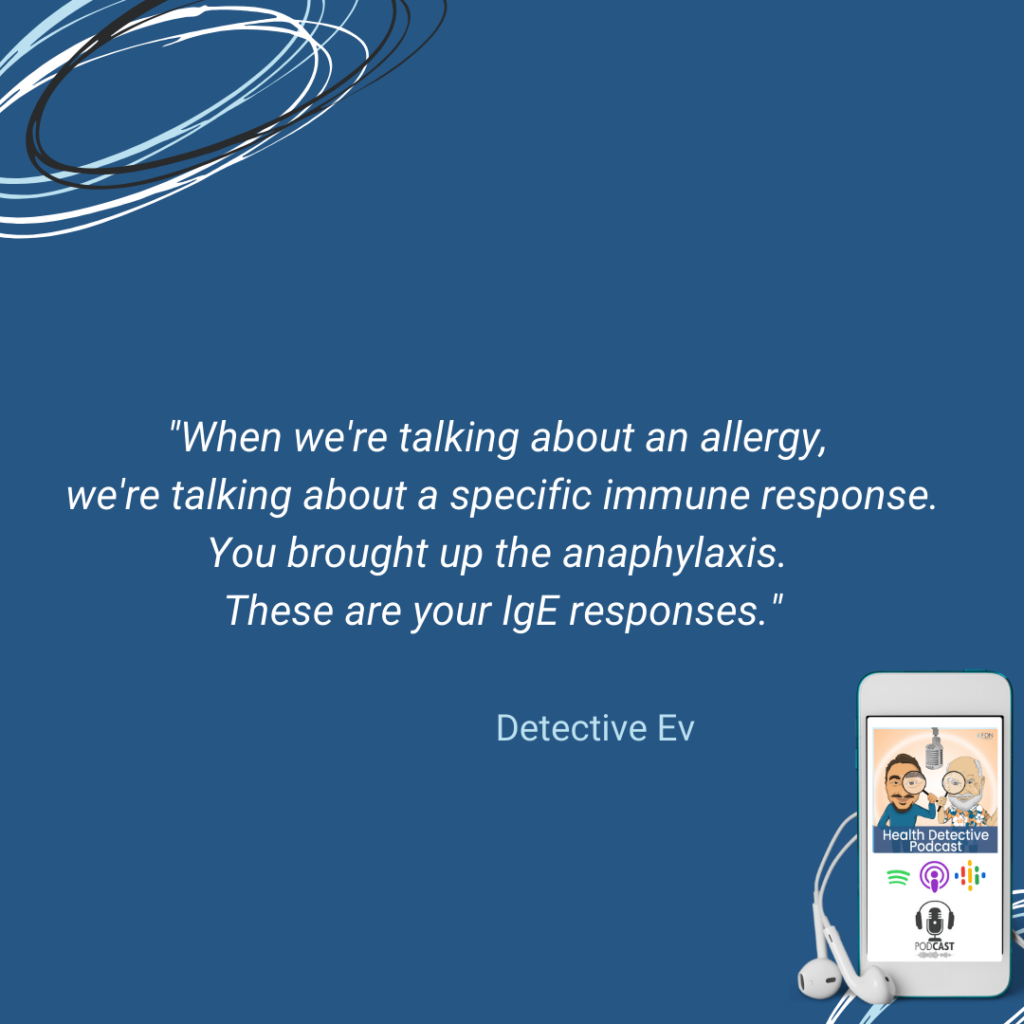
When we’re talking about an allergy, we’re talking about a specific immune response. You brought up the anaphylaxis. These are your IgE responses. Anytime you’re seeing a kid at the peanut table, at school, that was someone with a legitimate IgE response that could potentially hospitalize them. Worst case, it could actually cause someone to pass away depending on how severe it is.
Sensitivity, I don’t know if you define this differently. I typically look at it as an immune response that is not an allergy. Is that fair to say or is that too broad?
[00:14:04] Whitney Morgan: No, I would say that’s fair. Yes. It’s an immune response exclusive of IgE, correct.
Detective Ev: Okay, got it.
Whitney Morgan: It could be IgG, IgA, it could be some sort of mediated response that’s more non-specific.
[00:14:17] Detective Ev: Yeah, and it is broad. One of the things we’re doing today is kind of getting a little closer to wheat itself, but we’re looking at a lot of the different puzzle pieces, I think would be a good way to say it.
The Wheat Zoomer: Make Sure You’re Getting the Right Test
The test that we’re using today is wheat zoomer. Before I even pull that up on the screen share, what is it that we’re looking at? Because from my understanding, knowing your analogy now, I think we’re looking at multiple puzzle pieces, but we’re also looking at different ways that the body could respond to the puzzle pieces. Is that correct?
[00:14:43] Whitney Morgan: Yeah, we’re looking at the puzzle pieces. We’re also looking at reparative enzymes. And then the celiac panels are really more focused on identifying a certain level of damage in the gut that is common in people with celiac disease.
Here’s the thing. When someone says, oh, I wonder if I have a problem with gluten, and they go to their doc and say can you test me for gluten sensitivity? Well, most docs will run a celiac panel on you. Then it comes back negative because, let’s be honest, only 1% to 3% of the population has celiac disease. Then they say, you don’t have a problem with wheat.
Well, that’s a lack of understanding of the testing because a celiac panel is not testing for wheat and gluten sensitivity. It’s testing for celiac disease. Very different process. So, you can test negative to celiac and still be wicked gluten sensitive. So, that’s one thing.
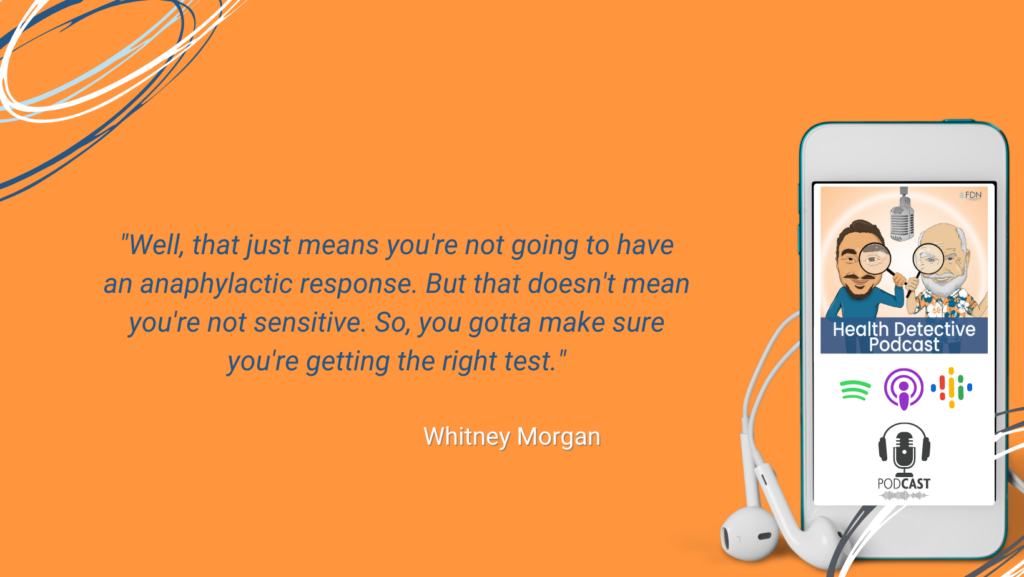
The other thing is they might send you to an allergist. Well, that’s an IgE response. If you come back into green on wheat and gluten and you get told, oh no, you’re fine there. Well, that just means you’re not going to have an anaphylactic response. But that doesn’t mean you’re not sensitive. So, you gotta make sure you’re getting the right test.
The Wheat Zoomer: Biggest Bang for Your Buck
The wheat zoomer is definitely the right test.
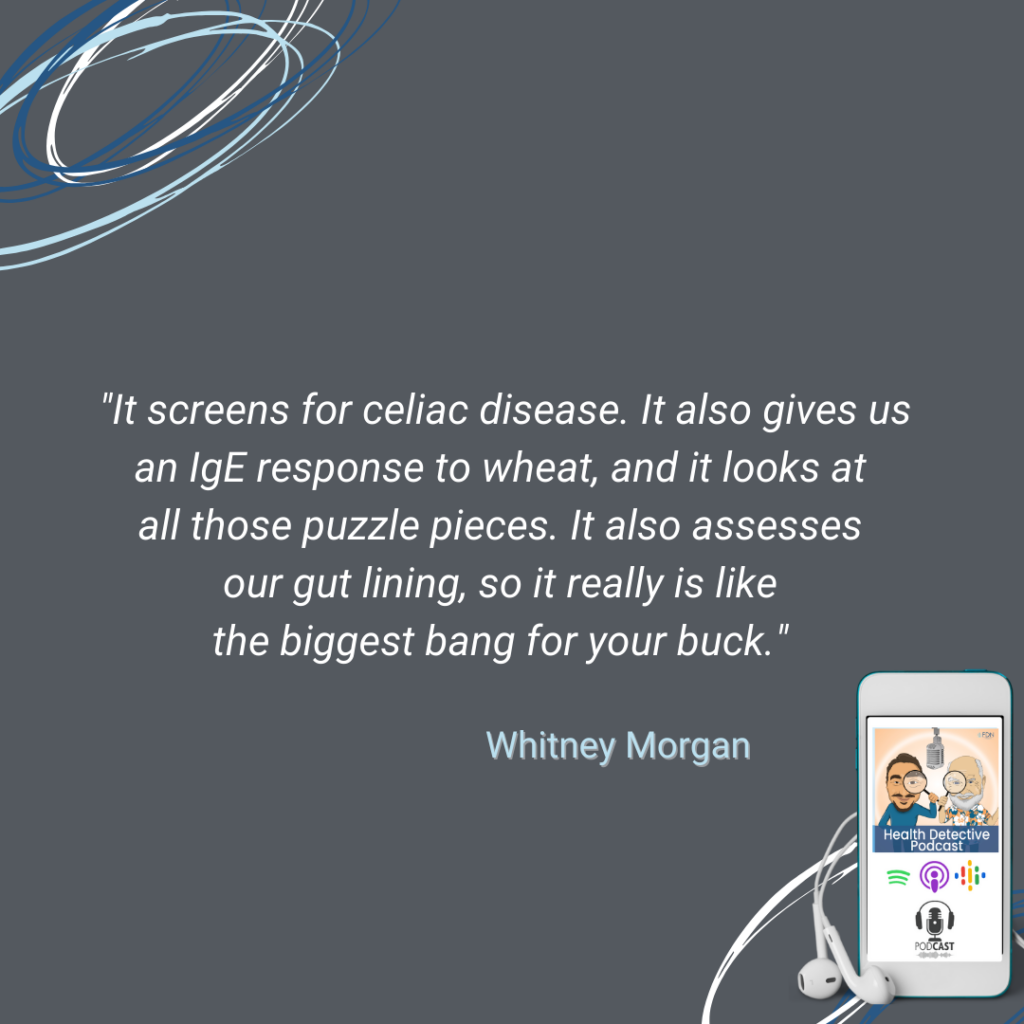
It screens for celiac disease. It also gives us an IgE response to wheat, and it looks at all those puzzle pieces. It also assesses our gut lining, so it really is like the biggest bang for your buck.
[00:16:11] Detective Ev: Sweet. Well, I’m excited. We definitely built the suspense for this one.
We’ll finally share the screen for you fine people here. So, if you’re one of our YouTube, friends, I’m going to try to keep the screen as steady as possible until we shift.
I love Riverside. We love you guys. You’re a great program. But the screenshare thing has been quite an issue where sometimes my screenshare just won’t pop up and then I gotta go back and record it afterwards.
My wonderful girlfriend who has done video editing, she actually edits it in for us. Hopefully we’re not dealing with that this time. I will actually zoom in on this for you a little bit too. You just tell me when to scroll. We’ll start up here.
[00:16:40] Whitney Morgan: Yeah, go up just a little bit. The first thing you see is you get these scores, right? We have a wheat score, and we have intestinal permeability score. You can see the wheat score is off the chart.
Now this is kind of like getting a final exam grade. You think, well, why did I get a D? It’s because essay questions are worth more than your multiple choice, and you really screwed it up on the essay. So, I don’t know what their weighted algorithm is behind the score, but there are different reactions that are more clinically significant and serious.
The Wheat Zoomer: IgG vs IgA
Depending on what you’ve got going on, that’s going to impact your score. Same with the intestinal permeability score. But this is a snapshot that makes you go, oh, I got a problem.
[00:17:23] Detective Ev: So, regardless if I knew nothing else about the test, I can look at this and already tell the person, okay, this is not going well for you. You’re probably dealing with some stuff here.
[00:17:30] Whitney Morgan: Then we have the positive, moderate reactions. This is the summary. Shows us all of the puzzle pieces we reacted to, all the ones we were negative to. And then, did we have an IgA reaction or an IgG?
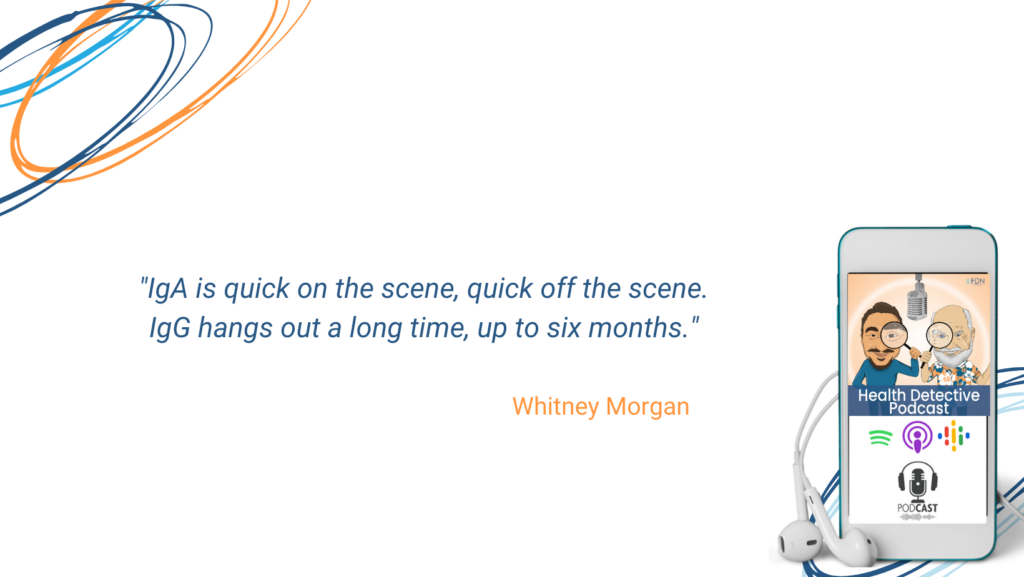
IgA reactions are like your first responders. You get in a wreck on the highway. That’s the EMT that comes, boom. That’s your IgA. Then they hand you off to the hospital folks and they’re your long-term care. You get admitted. They hang out with you until you’re better, right? So, IgA is quick on the scene, quick off the scene. IgG hangs out a long time, up to six months.
So, when we have IgA reactions, we know this person was exposed to these puzzle pieces within the six to 12 days prior to the blood draw. Otherwise, those IgA antibodies would be gone. With the IgG reactions, we know they were over the past four to six months.
These are all the puzzle pieces they were exposed to. We can see both elements and when we have both elements, we can tell ourselves a story. If I was talking to this client, I would say, okay, in the two weeks before the test, did you go out to dinner or did you eat inside your home the whole time?
The Wheat Zoomer: Micro Gluten Exposures
Well, I never go out to dinner. I go out like maybe once a month. I was super, super careful cause I knew I was going to take this test. So, I was really on top of my game. Okay, well you still got exposed, so it must be something in your house that you’re not aware of. Right?
It is that kind of investigative process. You still have to kind of ask your client the questions so you can develop the most appropriate story. It’s like solving a mystery, right?
[00:19:15] Detective Ev: Do you remember with this particular client? Again, I’ve never ran one of these, but it seems like it’s kind of lit up. Was this someone who was actively eating wheat, or did they think that they were off of it?
[00:19:24] Whitney Morgan: They were gluten free. That’s another thing. No one’s as gluten-free as they think they are. They didn’t live in a gluten-free house. They actually are a partial owner of a restaurant that is predominantly a gluten-free restaurant. Super, super organic, grass fed, all this kind of stuff. But they ate at this restaurant frequently. Their restaurant where they controlled everything, that was kind of where they dined out.

Also, this client had a pretty stressful job and occasionally would go out for lunch with colleagues. So, you got all these possible exposures, dining out, and you know, gluten is still walking through your front door, even though you might be knowingly avoiding it, not eating it yourself. But it’s still in your kitchen and you’re getting these micro exposures.
The Wheat Zoomer: A Good Test to Help You Figure Things Out
[00:20:13] Detective Ev: Do you do the medical director program for these? Are you one of the people that does the consults for this?
Whitney Morgan: Oh yeah.
Detective Ev: Awesome. Well, I’ll give you a test soon probably. I’ve been telling my girlfriend I want to run one of these.
I don’t eat out, but we do have this one natural food market. The owner, she’s gluten sensitive. I know that she’s a wonderful woman in case she ever listens to this, but she doesn’t understand this as deeply as we do as FDNs. It’s the one deli that I’ve attempted at it with, and I’ve eaten there pretty frequently. That place, I seem to do okay at. But we also know that we can’t base this just off symptoms.
I would be surprised if I ate there as frequently as I do and did not have symptoms. But I want to kind of check this and so I’m going to do a thing where it’s just like maybe every other day for a week I try it out, you know what I mean? When they’re making different batches of this stuff, give them a few chances and see what happens. I don’t want to believe that I can’t do that.
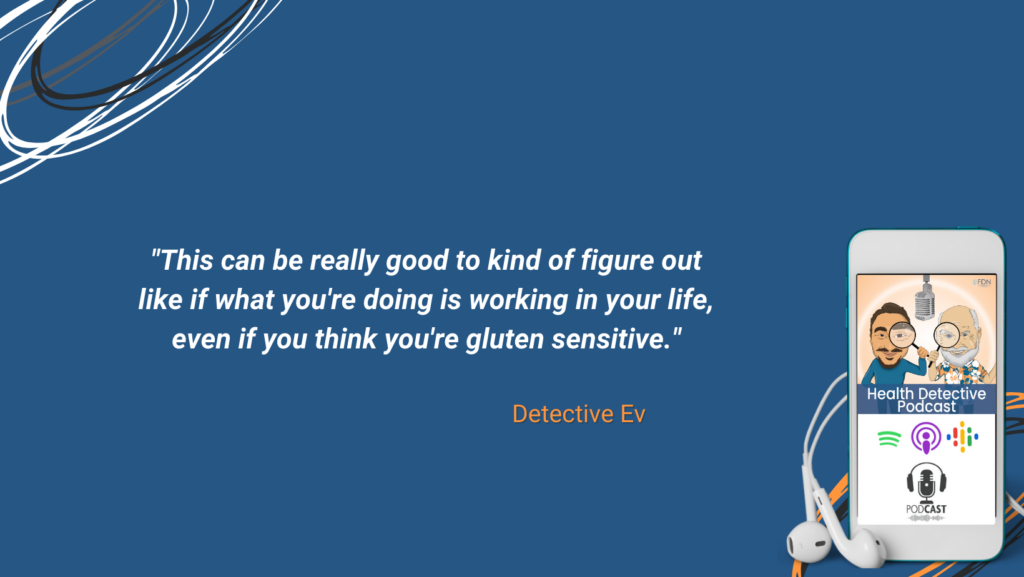
But I also know for me and my family’s history, the last thing I want is having a reaction actively happening that I don’t even realize. I know what the next step will be for me then. This can be really good to kind of figure out like if what you’re doing is working in your life, even if you think you’re gluten sensitive.
The Wheat Zoomer: The Negative Summary Section
So, just to be clear on audio, we already went over the positive and moderate section for this client. The next one that we’re looking at together is the negative section. And there’s quite a lot going on here, some big science words.
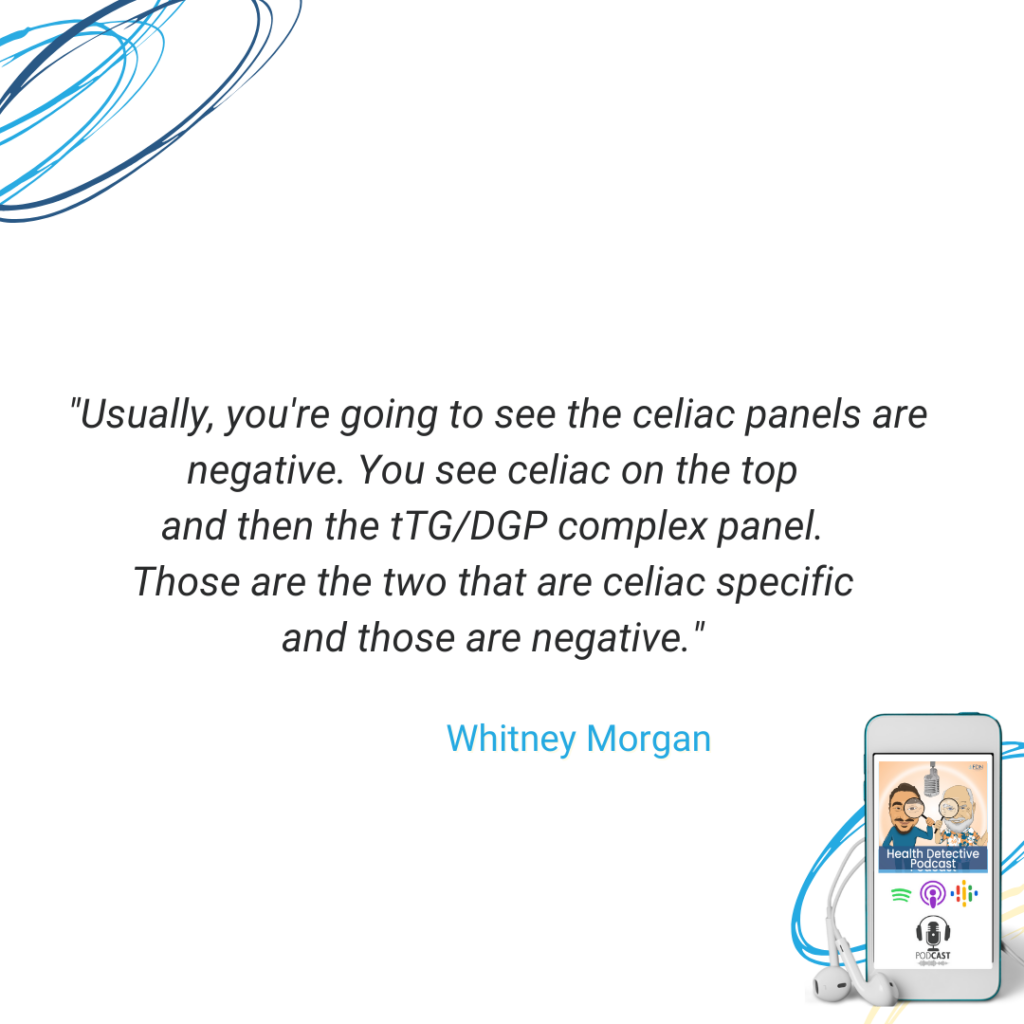
[00:21:24] Whitney Morgan: Yeah. Usually, you’re going to see the celiac panels are negative. You see celiac on the top and then the tTG/DGP complex panel. Those are the two that are celiac specific and those are negative.
Then, of the intestinal permeability panel, they were negative to anti-LPS. That’s the endotoxins from gram-negative bacteria. Then we could see, okay, yeah, their Transglutaminase panel 3 and 6 were negative. These are reparative enzymes that are specific for the brain and the skin. If they’re positive, they can be red flags for autoimmune disease progression in both of those locations.
Then we have a couple of gluten peptides that this person was negative to and a wheat peptide that the person was negative to.
[00:22:07] Detective Ev: Cool. Just to be clear with the celiac thing, cause I know it’s kind of hard to test, I’ve always been told it’s hard to test for that, especially if we’re not doing an endoscopy. How much do you trust this on the celiac side? I don’t know if there is an accurate percentage, but like, I’m assuming this cannot be a hundred percent accurate to diagnose or exclude celiac.
The Wheat Zoomer: Is it Accurate in Testing for Celiac?
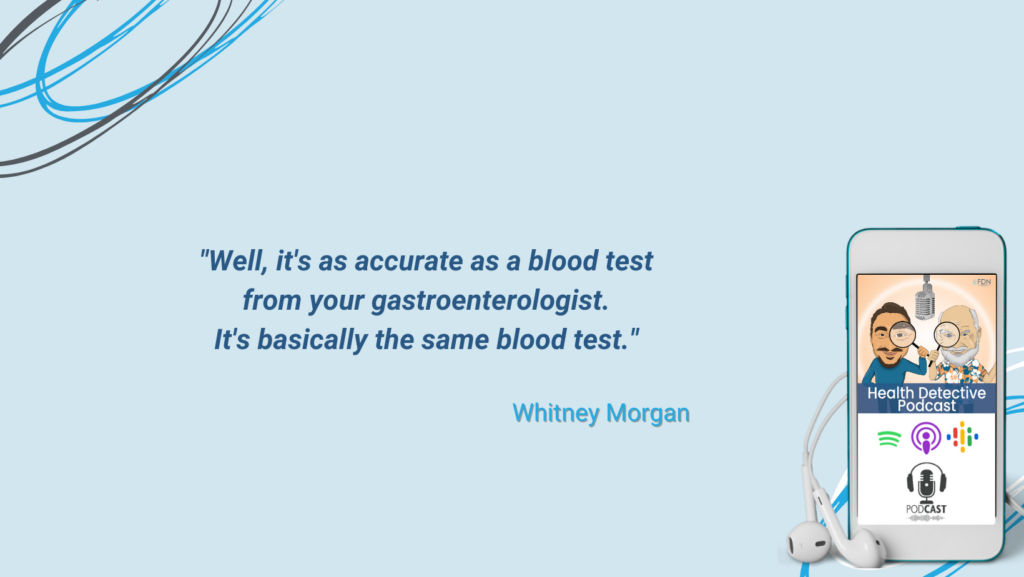
[00:22:24] Whitney Morgan: Well, it’s as accurate as a blood test from your gastroenterologist. It’s basically the same blood test. There’s criteria. You have to have antibodies to either Transglutaminase 2 or gamma gliadin or endomeceal and you have to have a genetic risk factor. And then you have to have some sort of positive biopsy in the endoscopy.
Not all practitioners, GI docs, will make you tick all those boxes. It just depends. But usually if you ask a doctor, I want to be screened for celiac disease, they’re going to start with a blood test. They’re not going to go straight to the endoscopy because that’s more expensive and that’s invasive, right?
[00:23:04] Detective Ev: Most people don’t want to do that. It sucks, it’s not fun. I wouldn’t sign up for that.
[00:23:07] Whitney Morgan: So, they’re going to run a blood test. Hopefully they include genetics. Then they’re going to see if you don’t have the genes and you don’t have elevated antibodies, they’re going to say, no. No reason for the upper GI because we already know you’re negative. We’ve ruled it out.
[00:23:23] Detective Ev: Got it.
The Wheat Zoomer: The Wheat Allergy Panel & Zonulin Marker
In the next section here, we just have the wheat allergy panel. They do test for IgE. It’s clear that this looks like this is not an allergy for this person, it’s a sensitivity.
Whitney Morgan: Right, right.
Detective Ev: Alright. As we go down here, we see that they also test for zonulin and that actually looks normal.
[00:23:38] Whitney Morgan: Zonulin is an enzyme that correlates with leaky gut when it’s elevated, but it changes very quickly in the gut. Zonulin can be normal even in the presence of a leaky gut. That’s why we look at antibodies to zonulin because they hang out for so long in the bloodstream.
[00:23:56] Detective Ev: Correct me if I’m wrong, unless you’re like literally doing a lot of the stuff that FDNs are doing over a period of time. I’m not saying zonulin is not an important marker.
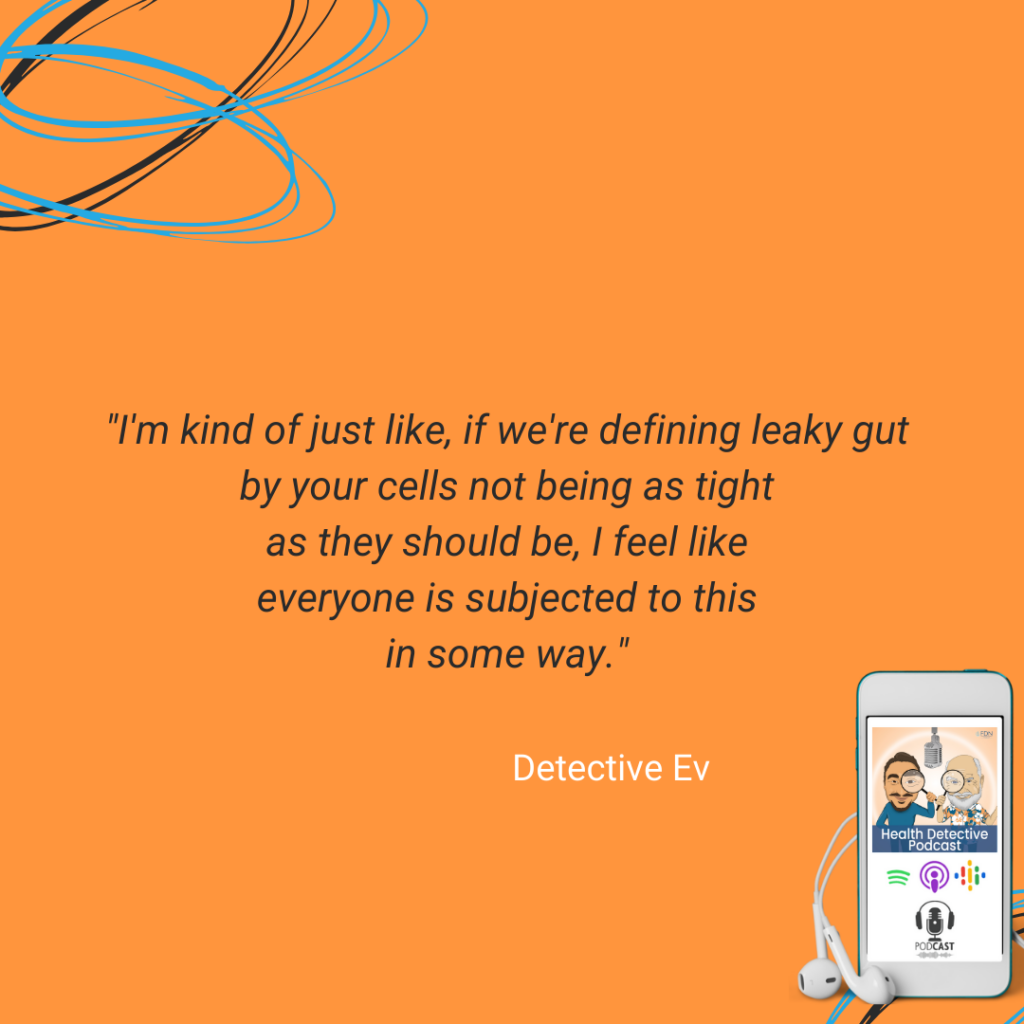
Again, my girlfriend and a friend, they just got their R&Rs done recently. He had a high zonulin, she had an in-range one. I’m kind of just like, if we’re defining leaky gut by your cells not being as tight as they should be, I feel like everyone is subjected to this in some way. I mean, yeah, you might have such a leaky gut that it’s like, wow, through the roof, you could see it on a test. But I mean, how do you approach that just on a side note?
Because I kind of look at it as I already make the assumption that if this person is not in the functional health space and living normal in America, any civilized country in this world, I don’t know how you wouldn’t have a leaky gut. Is that ignorant to assume or do you go with that assumption as well?
The Wheat Zoomer: Celiac Panel
[00:24:48] Whitney Morgan: I mean, I assume that too. In fact, you could just like throw a dart and anyone you hit’s got a leaky gut, chances are.
But then let’s remember this is blood. We’re not looking at zonulin in the stool, we’re looking for it in the blood. Different mediums have different accuracy points and different blind spots. So, when zonulin is elevated in the blood, then yeah, that’s another huge red flag that at the time of taking this test, this person had some major exposure that increased their zonulin and most likely gluten or gram-negative bacteria, something like that.
But a normal level it’s a non-clue in my book. Total non-clue.
[00:25:33] Detective Ev: Okay, good. As we scroll on down here. That one, just so you guys on audio know, that zonulin thing was kind of hanging out by itself.
Now we have a few things here. The first one is celiac. It’s kind of a whole celiac thing by itself.
[00:25:41] Whitney Morgan: The first two are Celiac. The first one that says Celiac on top of it, that’s the more traditional celiac panel, much like the blood test you’re going to get from your GI Doc. This is going to be negative 97% to 98% of the time when we run wheat zoomers because celiac disease is not as prevalent as gluten sensitivity or non-celiac gluten sensitivity. So yeah, this is negative.
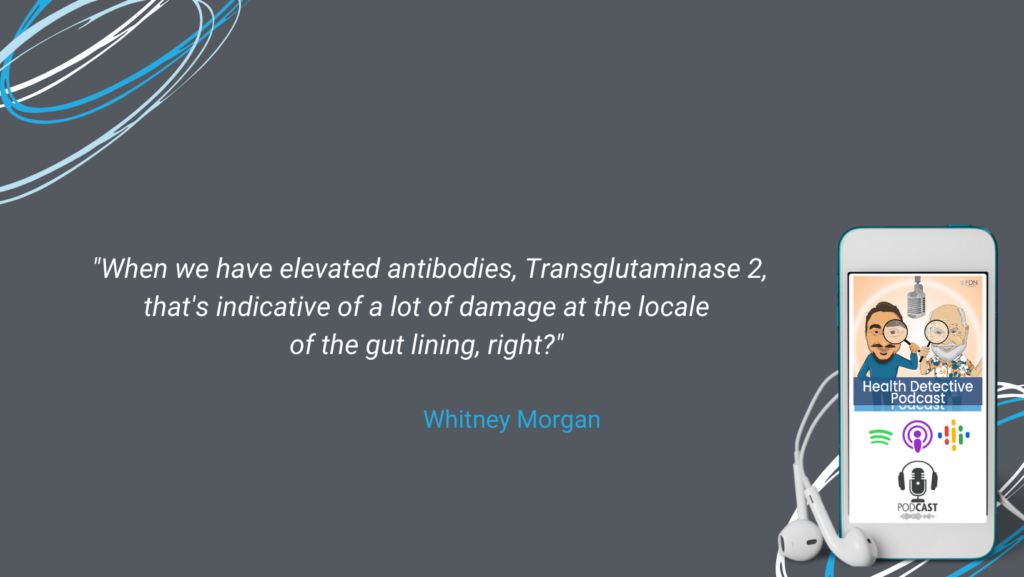
Transglutaminase 2 is a reparative enzyme. It’s everywhere really but it’s highly concentrated in the gut, in the small intestine. When we have elevated antibodies, Transglutaminase 2, that’s indicative of a lot of damage at the locale of the gut lining, right?
The Wheat Zoomer: Predictive Fusion Peptide Panel
This blows people’s minds, but I have celiac disease. When I ran my first wheat zoomer, both of my celiac panels were negative cause I’ve been gluten-free for a long time. I’m appropriately managing my celiac disease. But I still had antibodies to a variety of different gluten and wheat peptides because I was getting these infrequent exposures at a low enough and infrequent enough rate that it wasn’t triggering the gut damage associated with the celiac disease.
My celiac panel continues to be negative, that’s great news for me. It means I’m successful at controlling my celiac disease, but I wasn’t successful at keeping gluten completely out.
[00:27:09] Detective Ev: Guys, if you’re just meeting Whitney, that’s actually surprising to me.
Whitney Morgan: And I live in a gluten free house.
Detective Ev: That’s the point.
[00:27:16] Whitney Morgan: I’m like wicked hardcore.
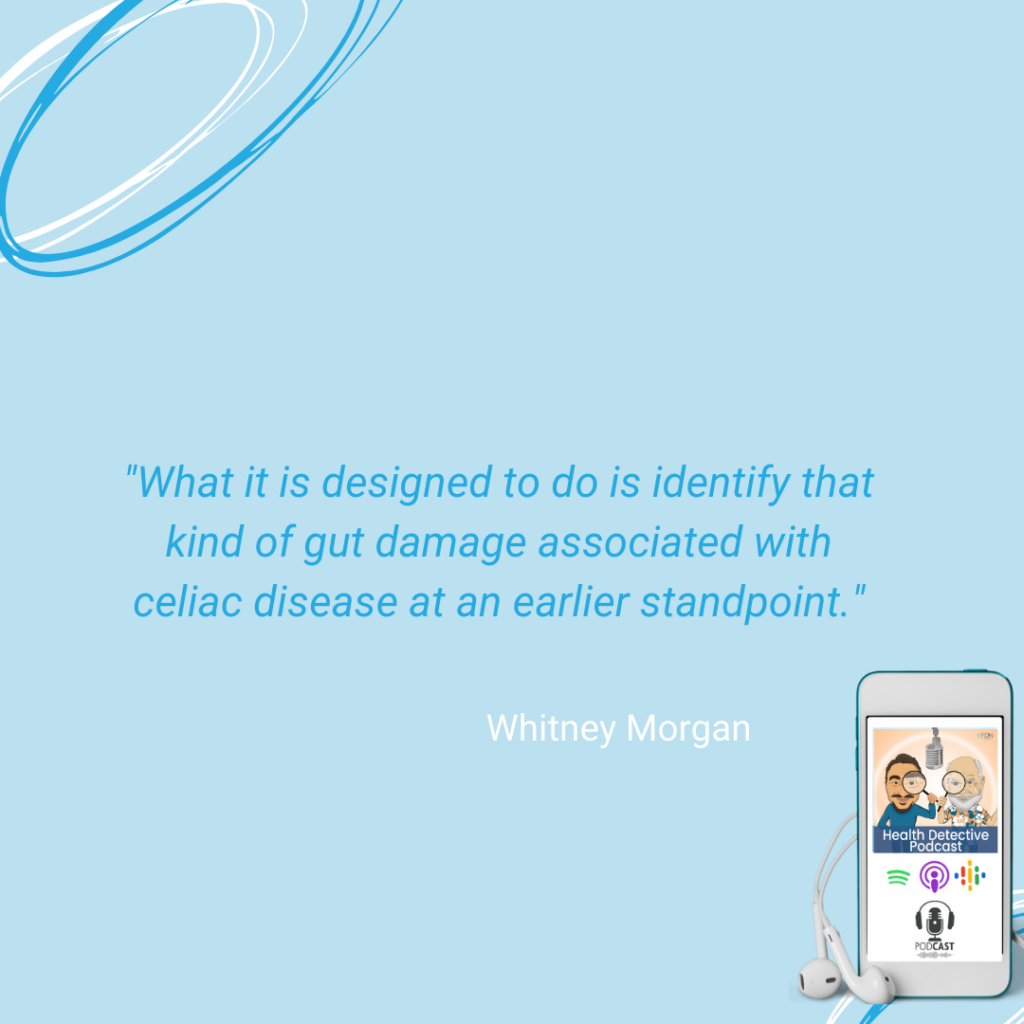
So, the second panel is unique to Vibrant. They have developed this panel; this is a fusion peptide panel. What it is designed to do is identify that kind of gut damage associated with celiac disease at an earlier standpoint. In other words, if you’re five to seven years away from full-blown celiac disease, in theory, this panel can catch you.
If I see a negative celiac panel, but the complex, the fusion peptide panel is positive, I can say, I can’t tell you, you’re definitely going to get celiac disease. But I can tell you there’s a high likelihood that you’re walking down that path and you’re headed in that direction. But if you go to your gastro and say, I want to get screened for celiac disease, you’re going to be negative because I’ve got a negative celiac panel right here.
So, this second one is a predictive celiac panel.
The Idea of Predictive Autoimmunity
[00:28:18] Detective Ev: Yeah. The first time I got introduced to that idea of predictive autoimmunity was the Dr. Tom O’Brien’s book, The Autoimmune Fix. I remembered him talking about how they took the blood from military people, and they could predict with 93% accuracy, or something, getting lupus like seven years later. That’s incredible stuff.
It sucks because I feel like we’re in one of the bigger health crises that we’ll ever have. But the good side of this, just like the mental health thing with the pandemic, is there’s so much awareness now coming around these things that I feel like, all right, wow, we are sunk down. We’re low. But as the awareness increases, we’ll just have better and better steps.
Technology’s getting better and better. Technology sometimes has been to our detriment, ironically, with our health. But my gosh, we’re talking about a predictive autoimmunity thing. The idea that I could predict with 93% accuracy, which is only going to get better over time.
If you are going to have lupus in seven years, I mean, that’s not even that big of a deal. That’s like, hey, still go enjoy your weekend, enjoy the birthday, and you know what the next Christmas too. Have a great time. But we need to get some work done pretty soon here so that you don’t get this eventually.
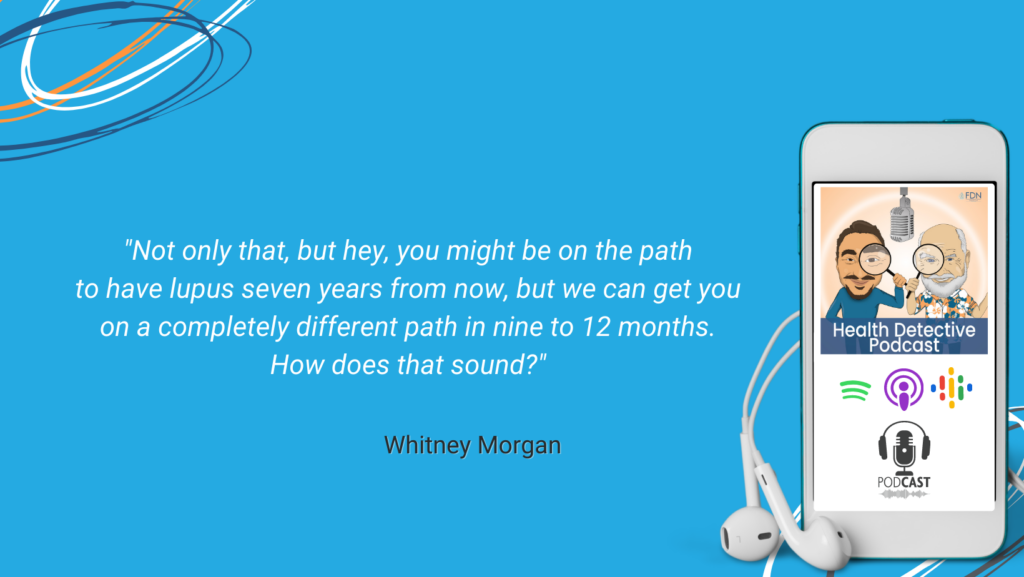
[00:29:21] Whitney Morgan: Not only that, but hey, you might be on the path to have lupus seven years from now, but we can get you on a completely different path in nine to 12 months. How does that sound?
[00:29:34] Detective Ev: Yeah, before the real pain comes here, where you start feeling this. That’s amazing.
Whitney Morgan: It’s like having a crystal ball.
Detective Ev: Yeah.
The Wheat Zoomer: The Intestinal Permeability Panel
The next section here is the intestinal permeability panel. This is first one of these little subsections that we’re starting to see some red, high risk.
[00:29:49] Whitney Morgan: You see the zonulin repeated there again, and it’s normal. But then you see the anti-zonulin, which is high. It’s the IgG and that’s because, like I said, IgG hangs out for up to six months in the bloodstream. That’s why it’s really important to look at IgG because we’re more likely to catch those things, right?
That’s really high, 2.06. So, yeah, anti-zonulin indicates that there’s some damage at those tight junctions, those little gateways between the cells that line our small intestine. That’s usually due to gram-negative bacteria in the gut or gluten.

And then we have anti-actin. Now actin, I think of it as kind of an architectural framework for the cells. It provides integrity to all the cells that line the gut. It also supports those tight junctions. It provides a little integrity to the tight junction resiliency. So, when someone has antibodies to actin, that means there’s some immune system damage going on at the level of the cell.
That often means, it could indicate an autoimmune process for sure. But basically, in our speak, we would say this person has paracellular, transcellular, leakage. Leakage around the cells and through the cells.
[00:31:13] Detective Ev: Okay. Do you want to go to the next thing?
Whitney Morgan: Sure.
The Wheat Zoomer: The Transglutaminase Panel
Detective Ev: Then we have the transglutaminase panel. That all looks pretty good.
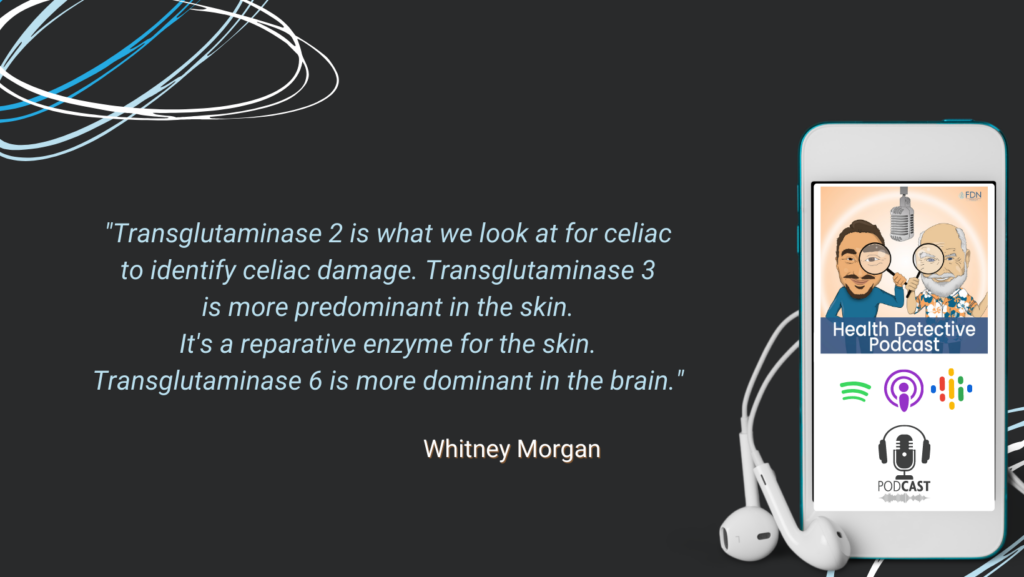
[00:31:20] Whitney Morgan: Transglutaminase 2 is what we look at for celiac to identify celiac damage. Transglutaminase 3 is more predominant in the skin. It’s a reparative enzyme for the skin. Transglutaminase 6 is more dominant in the brain. If we have antibodies to either of those enzymes, that’s a red flag for potential autoimmune progression in those locations. We need to look deeper.
If this was positive, like let’s say transglutaminase 6 antibodies were elevated, I’d want to see a neural zoomer on this person, or I’d want to see a Cyrex Array 5. I think Array 10 or 12 might be their brain one. That’s where we’re looking at all the puzzle pieces of the brain to see are you making antibodies to your own tissue. We can predict what potential risk factors you might have for neurological autoimmunity.
Psoriasis might be showing up with transglutaminase 3 or other skin autoimmune issues.
[00:32:19] Detective Ev: You just beat me, that was my question cause you said that before. Then we kept going through the other things. I was thinking about vitiligo, psoriasis, is this correlated with these types of things? Also, for me, I mean thankfully it got a lot better, but cystic acne. My mom had a history of that, but we also had these kinds of histories of autoimmunity as well.
Would something like this correlate with acne, even though acne is not in and of itself an autoimmune thing? Or would it only be the autoimmune diseases?
[00:32:43] Whitney Morgan: I don’t know the answer to that. That’s a really great question. I bet you Vibrant would have some research on that.
The Wheat Zoomer: The Wheat Germ Panel
But you know, I have to say cause I have psoriasis too. I’m an autoimmune collector, you know, I’ve got four autoimmune diagnoses. They’re all in remission, but I come back negative on transglutaminase 3. I think it’s because my psoriasis has always been very, very mild, a very small percentage of my skin. And I live the lifestyle that I live.
If I was seeing someone who had major uncontrolled psoriasis where they would call it more moderate to severe, then I would expect it to correlate. But it doesn’t always correlate. It depends on the person and their lifestyle.
[00:33:25] Detective Ev: Alright.
Going down to, oh, whoa. Lot of reds and yellows over here. We got the wheat germ panel followed by the gliadin panel. We’ll start with the wheat germ panel. What are we looking at here?

[00:33:33] Whitney Morgan: Wheat germ is not gluten. It is the lectin of wheat. It is the big bad of all the plant lectins. There are only two tissues in the body that wheat germ cannot attach to. Just think about that. Wheat germ damages the gut. It causes leaky gut. It gets through the gut lining, infiltrates the bloodstream, and now it’s on a superhighway to anywhere it wants to go. It goes to the thyroid, it goes to the breast, it goes to the pancreas. It can go to all organs and tissues, except two.
Once it attaches, then the immune system sees it and goes, whoa, whoa, whoa. You don’t belong there. It goes after the wheat germ, starts to try and eliminate it. During that process, some of the surrounding human tissue can be destroyed. And that’s what we call autoimmune disease by collateral damage.
The Wheat Zoomer: Destructive Characteristics of Lectins
[00:34:37] Detective Ev: What are the two tissues?
[00:34:38] Whitney Morgan: I want to say the eye, something in the eye. And I can’t remember the other one.
[00:34:47] Detective Ev: No worries. I’m just like, it’s a cliffhanger. Come on! That’s why we have Google, guys.
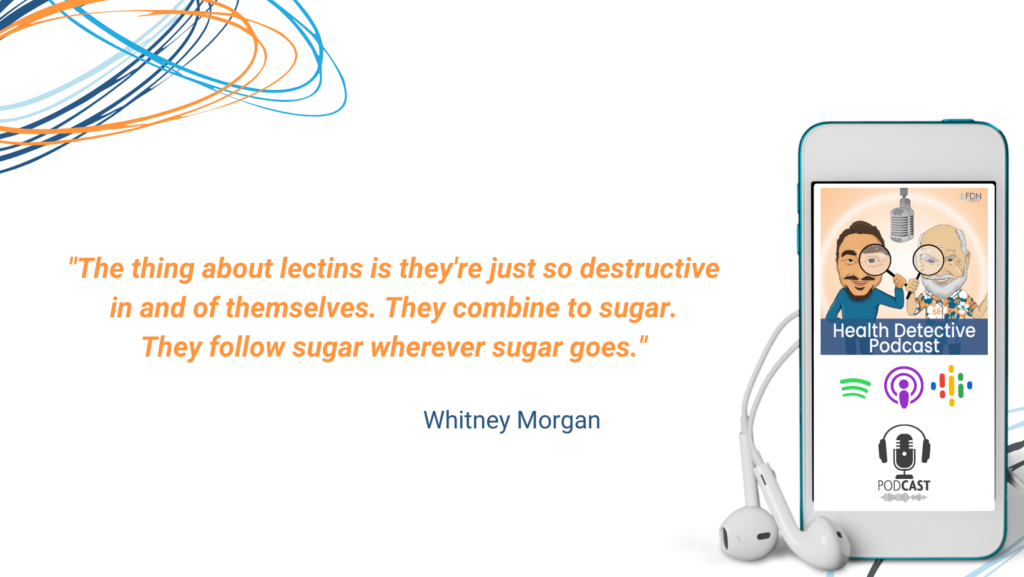
[00:34:50] Whitney Morgan: But the thing about lectins is they’re just so destructive in and of themselves. They combine to sugar. They follow sugar wherever sugar goes. Sugar goes into your muscles, into your brain. It goes everywhere. They contribute to muscle wasting. They break down the blood-brain barrier. They contribute to autoimmunity systemically everywhere in the body.
They also can interrupt with hormone signaling and tell the body to store fat rather than burn it. I mean, there’s a reason we feed our livestock grains, right? High, high lectin content, boy makes you fat.
So, wheat germ, even without this reaction, if you’re not sensitive to wheat germ, it’s still not good for you. It’s not good for anybody. But for this person, this makes me very concerned. This is someone with Hashimoto’s. It’s like, well, of course. I would expect to see elevated thyroid antibodies on a comprehensive thyroid panel on someone with Hashimoto’s when they’re reacting like this to wheat germ. Cause I know their Hashimoto’s isn’t under control, right?
And if they’ve got Hashimoto’s and they’re female, most likely they’ve got other autoimmune diseases on the way. This is a high concern. I’d also want to see a neural zoomer because wheat germ and gluten in general is just so problematic for neurological disease that it’s better to be safe than sorry.
The Wheat Zoomer: The Gliadin Panel
[00:36:12] Detective Ev: We move on down to the gliadin panel. There’s a lot going on here. Many things to look at, many things that this person was reacting to.
[00:36:21] Whitney Morgan: Yeah. Gluten is a big clunky protein; it breaks up into gliadin peptides and glutenin peptides. So, we’re looking at the gliadin panel.

These are those gliadin puzzle pieces. We have Alpha, Alpha-Beta, Gamma, and Omega. The Alpha gliadin tends to be more reactive in people with celiac disease. I’m going to have a far greater potential to react to Alpha than any of the other gliadins, cause I have celiac disease.
When I see that with someone with Hashimoto’s, I’m like, whoa, you might have celiac disease. It just hasn’t been triggered. You just don’t have enough of the gut damage. I’d want to see genetics on this person. I just want to see to make sure what their risk factor is.
Alpha-Beta doesn’t correlate to anything specifically. But the Gamma and the Omega gliadins, when someone’s reactive to those, that can point to an increased risk of neurological autoimmunity, dementia, Alzheimer’s, those kinds of things.
Gluten impacts the brain more than it does the gut. Think about that, right? If you’ve got anxiety, depression, ADD, ADHD, any sort of mood disorder, brain fog, I mean, the list is endless. There’s a high correlation with gluten sensitivity and this is why, or one of the reasons.
Then we have gluteomorphin and prodynorphin. These are specific for the opioid receptor that we have. Gluten is addictive, absolutely a hundred percent addictive. And if someone is reacting, if someone has elevated prodynorphin or gluteomorphin, that tells me that gluten interacts with their opioid receptors, which means that it’s really hard for them to come off gluten.
The Wheat Zoomer: Cheating with Gluten and Feeling It
And when they do truly eliminate gluten, they’re going to feel like crap for the first few weeks because they’re going to be in withdrawal. Their body is going, I need my drug. And it takes a while for those opioid receptors who are used to getting flooded to recede and start to calm down.
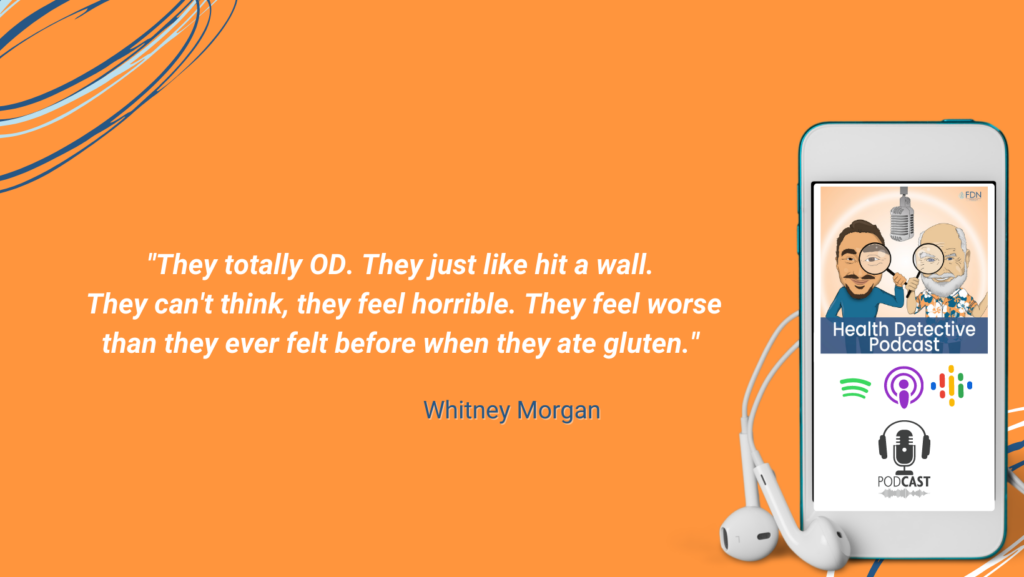
This is another reason why those same people, once they’ve been working with us for a while, they get their lives back and they’re feeling great. Then they’re like, oh, it’s my birthday. I’m going to have that gluten cake because I deserve it. They have a big piece of cake, and now it just hits them like a ton of bricks. They totally OD. They just like hit a wall. They can’t think, they feel horrible. They feel worse than they ever felt before when they ate gluten.
I get those calls and those five alarm messages, Whitney, oh my God. I just had a couple of bites. It’s like, yeah, because you don’t have those opioid receptors used to getting flooded anymore and now you just OD ‘ed.
[00:39:01] Detective Ev: Wow! And for the practitioners listening out there, the situation that you just brought up is actually fairly common. I wouldn’t recommend it. I could be wrong, but I find that when this happens, if it’s going to happen anyway, it’s almost a good thing.
Because I have had clients experience this. They’re feeling great, they’re kicking butt. Then they do it one time and they feel that way. That is usually the last time I ever get a call or text saying, hey, I intentionally cheated, because it’s not worth it. It’s not worth the stupid cake.
The Body’s Ability to Adapt
Go to the certified gluten-free bakery made by the celiac owner and buy the cake there. Like, this isn’t even like hard to replace. You can get a delicious cake that’s gluten free. There are certain foods, like dairy’s actually a little harder to really truly mimic. In today’s world, at the time of recording this, there is nothing that I miss about gluten, wheat, whatever, because I can replace it and the food tastes phenomenal. And it’s better ingredients in general.
You don’t have to be missing out on anything. Yes, price is one thing to consider. I don’t want to underestimate that. But I mean, what’s the price of your health? What’s the price of not being able to work properly? What’s the price of getting angry at your family members because you’re constantly in a pissed off mood. I mean, I’ll spend the extra few bucks on that.

[00:40:12] Whitney Morgan: Yeah. The way I like to think about it too is that when you spend all this time doing this work and cleaning up, well, our bodies are very adaptive. They’re going to adapt to anything if they can, so that we can continue to get up in the morning and go through our day and survive. And that includes all the crappy things we do.
If we’re smoking cigarettes and drinking alcohol and we’re sitting in a chair all day, our body’s going to do everything it can to adapt and keep us safe. That means increasing our tolerance for certain symptoms. Then suddenly 10 years down the road, we think we feel normal even though we’ve got all these symptoms, but now we’ve normalized to them.
The Wheat Zoomer: The Glutenin Panel
Then they work with someone like you and me and they feel better. They’re like, oh my God, I haven’t felt this way in five, 10 years. Then they go out and have that crazy hurrah experience, and their body’s like, wait, wait. I can’t adapt to that so fast. That took me years to adapt to, are you kidding me?
It puts an incredible amount of stress on the system, but that stress is a reflection of how healthy and in balance your body is, that it’s able to go, no, you don’t understand. This is really bad. This isn’t good for me, and I’m going to tell you that.
[00:41:29] Detective Ev: Absolutely. All right. I swear to God, time flies every time you and I talk. I want to make sure we get through some of the other stuff really quick if that’s ok.
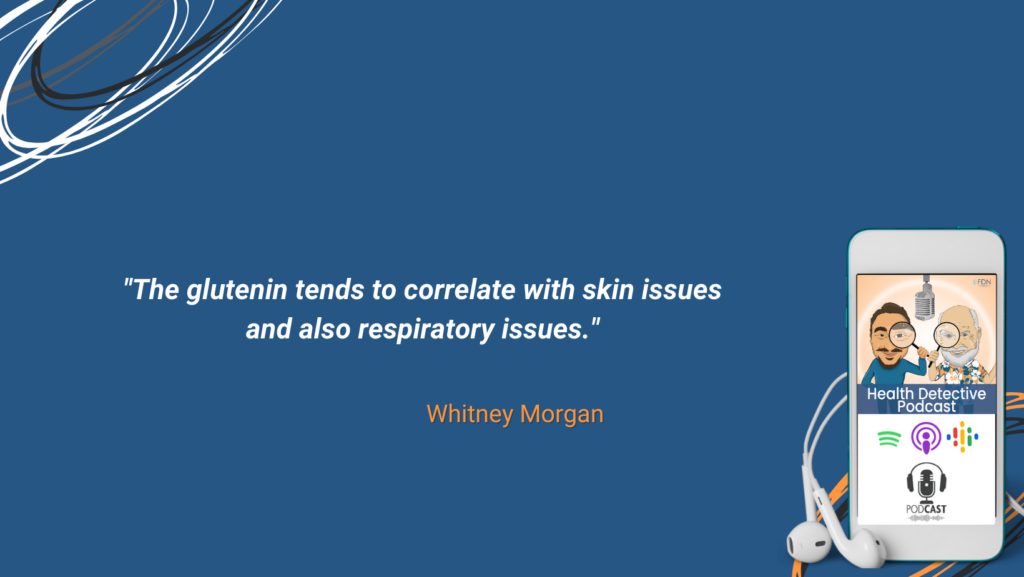
[00:41:35] Whitney Morgan: Glutenin is really easy. It’s just another piece of the gluten puzzle. This is gluten peptides, and this person is reactive to one of them. The glutenin tends to correlate with skin issues and also respiratory issues.
[00:41:55] Whitney Morgan: This is super important because people think they’re gluten sensitive, but I can still have wheatgrass, you know, like athletic greens. Everybody’s taking them and they got wheat grass in them. Well, you can’t take the wheat out of wheat grass. You can extract the gluten to less than 10 parts per million to make it certifiable gluten free, but you can’t take the wheat out of it.
The Wheat Zoomer: Amylase/Protease Inhibitors
And when we do the labs, 99% of people who are sensitive to the gluten puzzle pieces are sensitive to the non-gluten puzzle pieces. You aren’t just gluten sensitive; you are wheat sensitive, and you are gluten sensitive. Then this person is wheat, lectin sensitive. They are three very different things, right? They just come from the same big puzzle of wheat. It isn’t safe for this person to do their athletic greens. They gotta switch, they gotta get off that stuff.
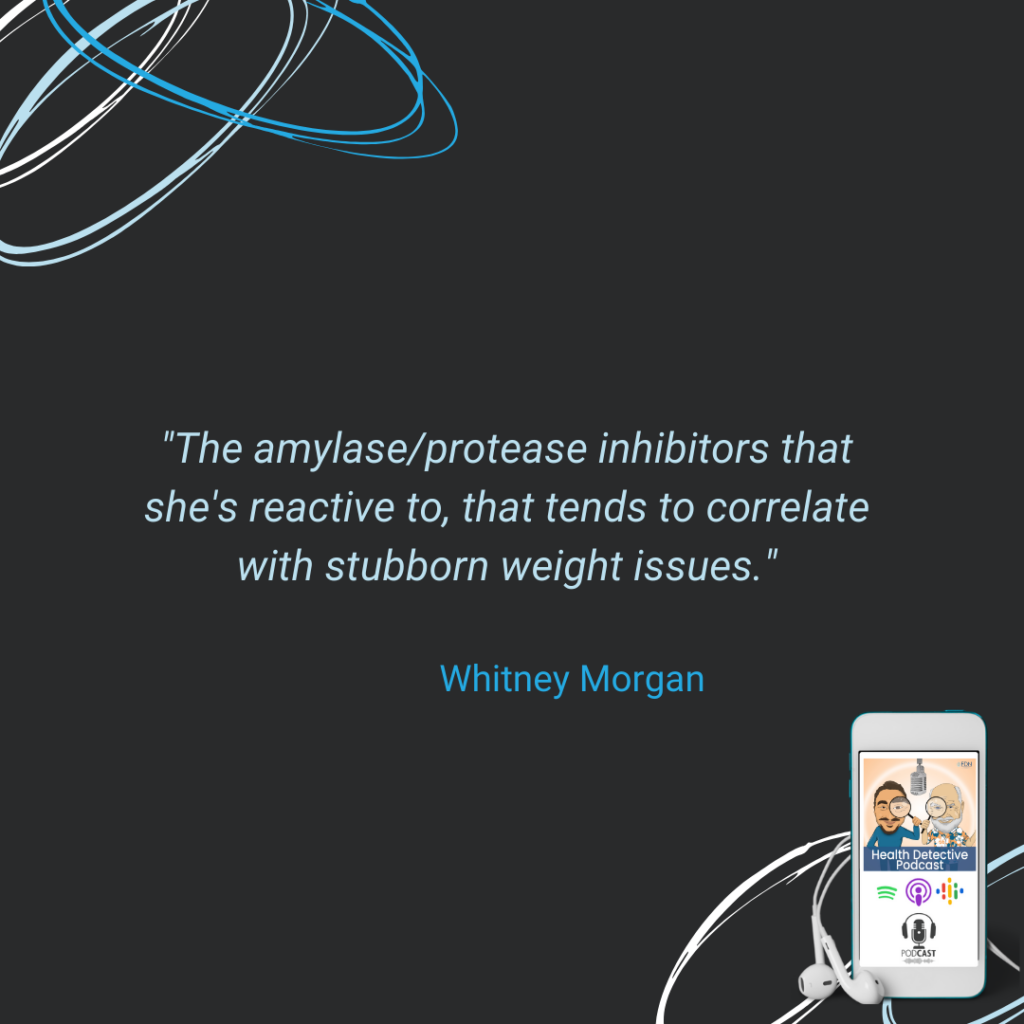
Interestingly too, this client was having difficulty losing weight. The amylase/protease inhibitors that she’s reactive to, that tends to correlate with stubborn weight issues. So, if you get off the wheat and you stop that exposure, your body has an easier time releasing that weight.
But yeah, this is very simple. It just says, hey, you’re wheat sensitive and gluten sensitive.
[00:43:15] Detective Ev: Gotcha. I’m going to stop sharing for those on video. This is on purpose and I’m going back to my screen with Whitney here as we kind of wrap this up.
Where to Find Whitney Morgan
I want to know where people can find you because if they’re listening to this and are even half as impressed as I am, I’d be wondering how can I work with this person to actually do things like this and the other work that we do? So where can they find you?

[00:43:37] Whitney Morgan: Sure. They can find me at Whitney Morgan Nutrition, that’s my website. That’s my Instagram and Facebook and my LinkedIn – Whitney Morgan Nutrition.
Detective Ev: Excellent. We’ll have that in the show notes.
Whitney Morgan: I run Zoomers on every single client. And not just the wheat zoomer, I do corn and dairy. We look at other mob bosses of the food world.
[00:43:59] Detective Ev: Nice. And if you guys like the wheat zoomer, you just wait till she breaks out her other Zoomers. You’re going to love that. We’ll have that in the show notes for you guys.
One thing, if you don’t mind that I want to finish up with. I mean, I’m aware of this, been doing this for a while, and then I hear something. I know I’m at least elementary understanding of this at this point is just a basic wheat sensitivity. That’s all I’ve ever really tested for. So, I stay away from it. I tried to for the last six, seven years. I have never intentionally consumed it during that time.
Then I hear someone like you. When you ran the zoomer, and I’m thinking about how far you were into your journey when you would’ve ran a zoomer, I know that you were on top of this stuff by then. Still, something got lit up.
How Did Whitney Get Gluten Under Control?
I admit it’s a transient feeling but it’s kind of like how hard really is this? When we’re looking at all these tests and you’re doing this with your clients, I mean, what’s the practical solution to this? Because you’re one of the most disciplined and aware people I know in this literally, and then it was still happening to you. How did you get that under control? What was it?
[00:44:51] Whitney Morgan: Yeah, it’s kind of like peeling back the layers of the onion. At the time that I did my wheat zoomer, yeah, I had been living in a gluten-free house for five years. And I only dined out at three restaurants, three different restaurants. Those are the ones I determined were safe.

When I got my results back, I was like, oh my God. Oh no. You know? I had to take a deep dive into my personal care products and kind of go through everything, start from scratch. Like I’m just going to look at everything, pull out everything in my pantry and my medicine cabinet and my supplements, and blah, blah, blah, blah, blah.
I found a couple of things that could be potentially suspicious and contaminated. So, I got rid of those. I found several personal care products that were problematic that I had just let sneak in. I just had gotten kind of lazy about that, I guess. It’s just about trying to perfect things.
What I decided to do is to use the wheat zoomer as kind of a test. In other words, my husband and I would go out to dinner once a week at most. It was always someplace that I thought was safe. Then it could have been the restaurant too, right? Maybe my house was fine.
Make Sure Everything Else is Improving
The way to test that is, I am not going to eat out for the next six months. Then I’m going to run another zoomer to see, am I safe? Is my house safe? For my clients, particularly those with celiac disease, but anyone with autoimmune disease and non-celiac gluten sensitivity, I say, run a wheat zoomer once a year.
If you’re feeling great and your test results are normal, run it once a year just like you would your CBC and your CMP at your doctor. If you get positive results, then you gotta run it twice a year because now you have to go back to the drawing board. Try and figure it out. You have to run the test again in six months. Give your antibodies time to clear.

It’s this process of investigation, and that can be frustrating. I hear what you’re saying. It’s like, oh my God. I mean, am I ever going to hit that safe spot? Well, what I usually say is, you may never get a negative wheat zoomer, that’s okay. What we want to do is stay on top of it. We want to make sure that everything else is improving. We want to make sure that you’re not having other antibody increases to other tissues.
If you’re feeling great and everything is great, and you get one or two reactions on your IgG, it’s like, okay. Yeah, you probably got exposed randomly when you went out for lunch with your friend, and that’s probably never going to repeat itself. But does that really matter in the big scheme of things? No, because 99% of the time you’re doing everything you need to do to keep safe, right? So, we always have to remember, correlate back to the client.
For Every Problem, There’s Opportunity
I have four autoimmune diseases. They’re all in remission. You know, if I see a wheat zoomer with one or two elevated antibodies, I think I’m doing a pretty good job. Now, if I had elevated thyroid antibodies and my celiac panel was showing elevation, that would be a different story.
[00:48:00] Detective Ev: Okay. I really appreciate that because I know you take this to a pretty high level. I don’t know if I’ve ever heard you give anything on this, but I’ve never talked to you about the Zoomers either. I love hearing that from Whitney Morgan. That it’s all right if these specific things are up and you’re running it once a year and you feel okay. Probably not the worst in the world, but here’s where I would draw the line.
That’s actually very helpful for me. I’m still going to run it cause I’m really wanting to know. I have this feeling in the back of my head, the deli I go to. What sucks too, cause even if it’s great 99% of the time, I mean, it’s a deli. They’re making new things and it’s not like they’re a dedicated gluten-free facility. So, there’s always a chance regardless of the owner being super aware of this.
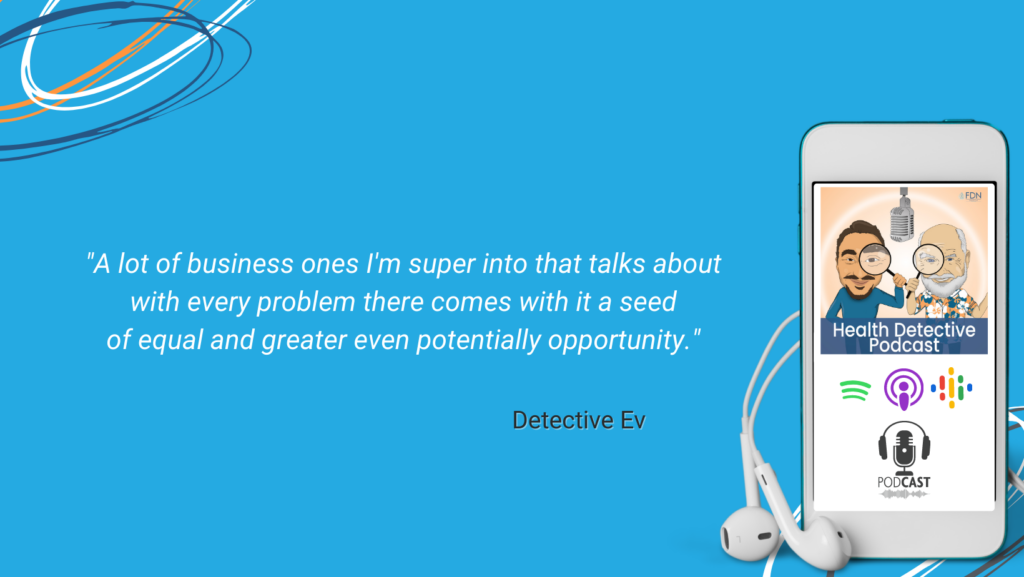
One thing I’ll leave people on too, just from an inspiring standpoint, there’s great books out there. A lot of business ones I’m super into that talks about with every problem there comes with it a seed of equal and greater even potentially opportunity. So, here’s your opportunity right here.
A Great Business Idea
I’m thinking about this myself. There are a lot of people like Whitney and myself, it is growing rapidly. There is a huge, huge demand for this. Might be a little premature to be like investing your life savings into it, but over the next 2, 3, 4, 5 years. The information’s spreading so rapidly. FDN is growing, many places are growing.

There are going to be people that want to go out to eat and are not so thrilled about it because they’re worried about things like this. So, if you can create a restaurant or a business or snacks that you can guarantee to the people, hey, I can’t tell you everywhere else, but this place is good. We never allow anything to touch this here. I think that’s a business opportunity.
We have like the second most popular gluten-free bakery in the greater Philadelphia area, thankfully, only 10 minutes away from me. They will hire anyone, but you are not even allowed to bring in lunch from outside of that facility into their place. You cannot eat lunch from the local stores in there. If you want to eat, it has to be stuff from the bakery, or you leave and then you can come back.
The owner has celiac. They get it, but that’s rare. That’s rare that those people get it. But they’re popular because of it, because there are people out there who get it.
So again, don’t go through your whole life savings on a restaurant like this, but it could be a side thing for sure. Like I’m thinking about it myself, who knows.
Conclusion
[00:49:57] Whitney Morgan: Oh yeah. We should talk because I’ve got a couple ideas.
[00:49:59] Detective Ev: I was about to say. Yeah. Whitney and Ev’s Bakery is coming soon and a nice restaurant.
So yeah, thank you so much for your time today. I just appreciate you coming on. This is a new one for me. It’s exciting me cause I want to get on this and run it. I feel like every time you share your information, it’s pretty obvious the passion that you have for this. I hope everyone else enjoyed this as much as I did. Thanks for hopping on with me.
[00:50:19] Whitney Morgan: Oh, thanks for having me. This is always so much fun for me to nerd out with the wheat zoomer. I appreciate the opportunity.
You can always visit us at functionaldiagnosticnutrition.com.
To hire an FDN Coach, go to fdnthrive.com.
For a FREE Health Review, go to fdnthrive.com/match/.

